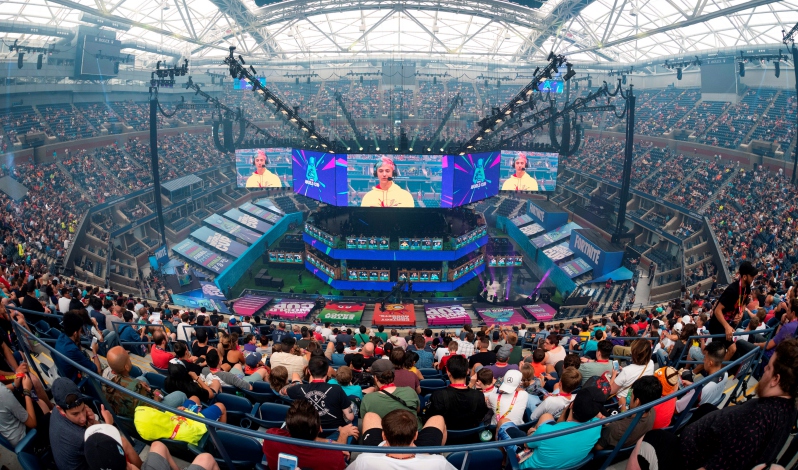
Scholars discuss how the rise of eSports—playing video games for an audience—poses new regulatory challenges.
Kyle Giersdorf threw his hands in the air after clinching victory in the final match at Arthur Ashe Stadium last year. Although the $3 million prize the 16-year old took home was slightly less than what Rafael Nadal won about a month later at the U.S. Open, Giersdorf’s prize was particularly notable because he does not play tennis.
In fact, Giersdorf does not play sports competitively at all. At least not in the traditional sense.
Giersdorf—who plays under the moniker “Bugha”—is a member of the Sentinels, an eSports team based in Los Angeles. eSports refers to organized competitive video gaming where players compete for prizes and amass fans in person, online, or at televised events. Business is booming, with billions of dollars at stake and millions of fans. The League of Legends 2017 world championship, for instance, had over 106 million viewers, eclipsing the number of people who watched the most recent Super Bowl.
As a young industry, eSports faces an array of legal and regulatory challenges as it “pursues its path toward becoming America’s next major national pastime,” a trio of legal scholars claim in a 2020 article. John T. Holden, Marc Edelman, and Thomas A. Baker III analyze how the eSports industry will confront a variety of regulatory and financial obstacles.
Holden, Edelman, and Baker explain that eSports started in 1972 when several Stanford University students hosted a Spacewar video game tournament with a top prize of a Rolling Stone magazine subscription. eSports blossomed into its modern form when wealthy investors, anticipating healthy returns, started pouring money into the nascent industry.
In some sense, eSports are like traditional sports—players competing for championships and prizes with fans cheering them along the way—but differences exist that present novel legal and regulatory concerns.
For example, eSports are based on digital games that are typically a private company’s intellectual property. An end user licensing agreement—a set of terms from video game producers that users must agree to before playing—often restricts how the video game may be distributed or used in public. In contrast, traditional sports such as basketball are not copyrighted; no one owns basketball or basketball’s rules and anyone can adopt the rules of the National Basketball Association.
Traditional professional sporting leagues often set rules such as minimum player salaries or conduct standards. Holden, Edelman, and Baker indicate that some eSports leagues are moving in that direction and are guaranteeing minimum pay for their players. Minimum pay in an eSports league, albeit below that of a traditional sporting league such as the National Football League, can provide stability in an industry with otherwise poor job security.
Questions remain about how current labor laws should classify eSports competitors, potentially causing certain legal complications. Some eSports players have been categorized as “professional athletes for visa purposes,” but Holden, Edelman, and Baker argue that eSports leagues may face lawsuits if the leagues are not exempt from the Fair Labor Standards Act.
Holden, Edelman, and Baker further articulate what they call the “ancillary issues” that come with eSports, such as gambling, doping, and collegiate eSports. Like in traditional sports, spectators often bet on eSports matches. Holden, Edelman, and Baker write that the 2018 U.S. Supreme Court decision in Murphy v. National Collegiate Athletic Association, which struck down a federal ban on sports betting, likely covers eSports as well. Sports betting companies, however, must receive state approval to allow eSports gambling.
Doping—typically associated with steroid use in traditional sports—is a growing problem in eSports. The use of nootropics, commonly referred to as “cognitive enhancers or smart drugs,” is prevalent enough that some eSports leagues are drug testing players for substances such as Adderall and Ritalin.
Holden, Edelman, and Baker suggest that the proliferation of collegiate eSports presents a challenge for traditional college sports organizations. They point to over 100 existing varsity college eSports programs across North America, and the number is rapidly increasing. Varsity eSports programs exist at schools that are members of the National Association of Intercollegiate Athletics (NAIA) and its larger counterpart the National Collegiate Athletic Association (NCAA)—two organizations that regulate student athletics.
Surprisingly, neither the NAIA nor the NCAA has opted to regulate the eSports programs for their respective member institutions. Because varsity eSports are so new—Robert Morris University established the first program in 2014—traditional athletic regulatory organizations may be hesitant to take eSports under their purview, Holden, Edelman, and Baker suggest.
In place of the NAIA or NCAA, varsity eSports programs have formed a “voluntary and member-managed association” called the National Association of Collegiate Esports (NACE).
Holden, Edelman, and Baker contend that the NCAA could decide to flex its regulatory muscle in the near future, in which case any power that NACE has over its member institutions could be preempted by the NCAA. But Holden, Edelman, and Baker indicate that there are reasons the NCAA might wait.
NCAA President Mark Emmert has expressed concerns that the organization could be seen as promoting digital violence. The NCAA also faces uncertainty in dictating which video games are played, as consumer interest normally influences game choice.
If the NCAA chooses to incorporate eSports, it will have to reassess its amateurism model, Holden, Edelman, and Baker argue. Traditionally, NCAA regulations prohibit athletes from playing a college sport for which they previously received compensation. The NCAA would likely have to “relax its adherence to amateurism” given the enormous amount of money flowing into eSports leagues and competitions with younger players, Holden, Edelman, and Baker claim.
Overall, eSports “presents a wide range of unchartered” legal and regulatory challenges, according to Holden, Edelman, and Baker. In the meantime, gamers such as Kyle Giersdorf will play on.



